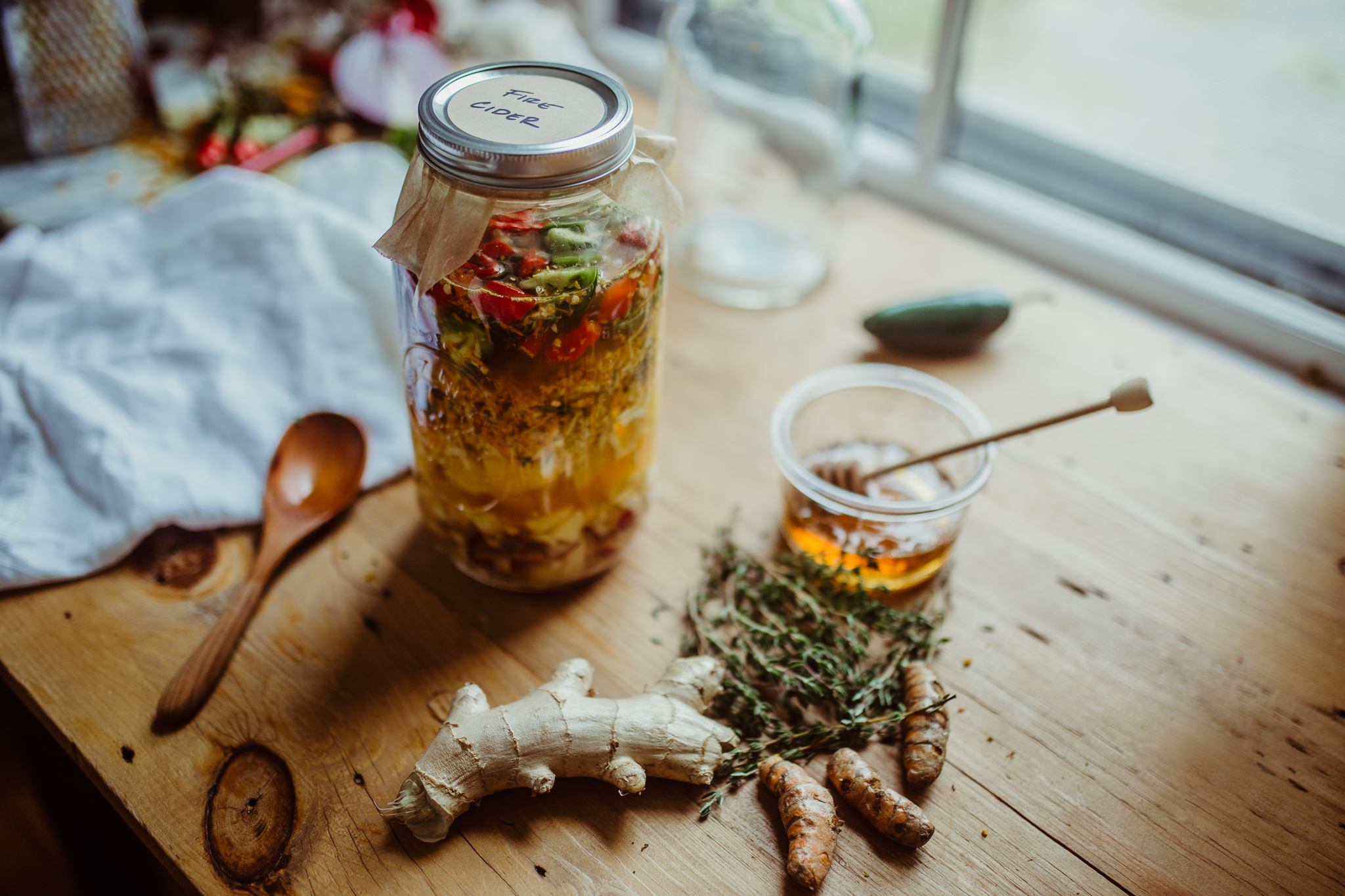
Pre-orders have been opened for the next batch of Fire Cider – order yours here! Please note that Fire Cider takes 3 weeks to macerate, so there is a 4 week lead time on all orders before delivery can take place.
*Below information from The Herbal Academy*
Our kitchen cupboards and herbal pantries may just hold the secret to beating the bugs this season! There are many things you can do to prepare for cold and flu season and many herbal allies you can lean on to help you if you end up getting sick. In this post, we’re chatting about all things Fire Cider (pssst – if you’re local to Chicago, you can pre-order yours from me by sending me a message here!)
Fire cider is a traditional immune-supporting remedy with deep roots in folk medicine (but most popularly championed by herbalist Rosemary Gladstar). At its most basic, it’s a zesty infused vinegar, packed with powerful immune-boosting, anti-inflammatory, anti-bacterial, anti-viral, and circulatory herbs. The addition of hot peppers and a little local honey makes it both spicy and sweet, hence the name.
Fire cider can be used in a few ways—as a defense against cold and flu pathogens, at the first sign of cold symptoms, and as a decongestant and expectorant when the cold has set in. Not only an immune tonic, homemade fire cider also stimulates digestion and helps moves circulation throughout the body and to the periphery (which helps keep us warm on cold winter days!). To use, sip a shot glass a day of this hot stuff beginning in mid-autumn and throughout the winter months.
What’s So “Hot” About Fire Cider?
Onions and other members of the allium family (like shallots, leeks, and especially garlic) are high in flavonoids (including quercetin and kaempferol), polyphenols, and the important constituent allicin. They are antimicrobial, antiviral, antioxidant, immune-enhancing, and anti-inflammatory, and they help enhance the action of vitamin C (Duke, 1997; Li, 2008).
Horseradish strongly stimulates the digestive fire, increasing gastric secretions and appetite. It also promotes perspiration, making it useful in fevers, colds, and flu. Horseradish is also an expectorant and is mildly antibacterial. It’s often used in both respiratory and urinary tract infections (Murray et al., 2005).
Ginger is warming, and it stimulates circulation of the blood (so it is used to remove pathogens from the bloodstream). It’s widely used in Ayurveda and traditional Chinese medicine to break up congestion throughout the body, including in the lungs and nasal passages. Ginger may also be used to help break fevers by warming the body and increasing perspiration. It’s also a powerful anti-inflammatory, stimulates immune activity, and can soothe nausea (Murray et al., 2005; Duke, 1997).
Apple cider vinegar (ACV) and honey both have antibacterial properties and can help boost energy levels (ACV helps break down lactic acid buildup which leads to fatigue, and honey stimulates the metabolism) (Brandon, 2014; Fessenden, 2015), among other benefits.
Hot peppers that are high in capsaicin (like cayenne) are a great bang for your buck in the early stages of colds because they increase circulation and mucous secretions. They move fluid from within and bring heat and moisture to the surface. They’re often used topically to ease pain and discomfort by blocking a neurotransmitter called substance P (Murray et al., 2005; Duke, 1997; Wood, 2008).
Thyme is a lovely herbal ally for the respiratory system. It’s powerfully antimicrobial, thins mucus making it more easily expectorated, and is a tonic spasmolytic. It’s also a strong digestive aid and can be helpful where there’s a stomach “bug” along with cold symptoms (Wood, 2008).
Additional Ways To Use Fire Cider
Fire cider is so versatile! Combined with olive or avocado oil, it makes a zesty salad dressing, and you can also add it to soups and stews.
Other possible uses:
- Rub into sore muscles and aching joints.
- Soak a clean flannel cloth in fire cider and place on the chest for congestion.
- Mix with honey to make a soothing, expectorant cough syrup.
- Add to a Bloody Mary



